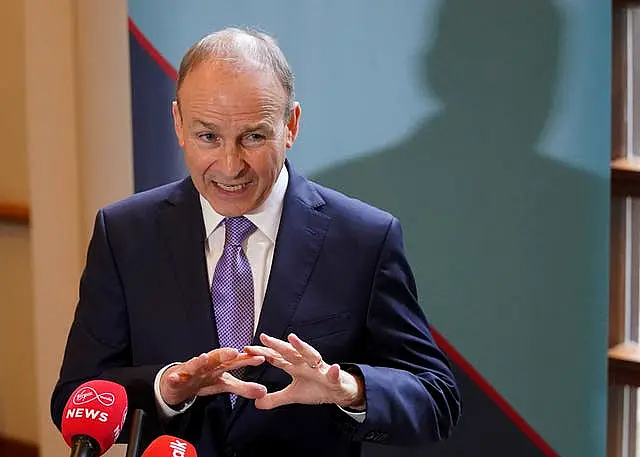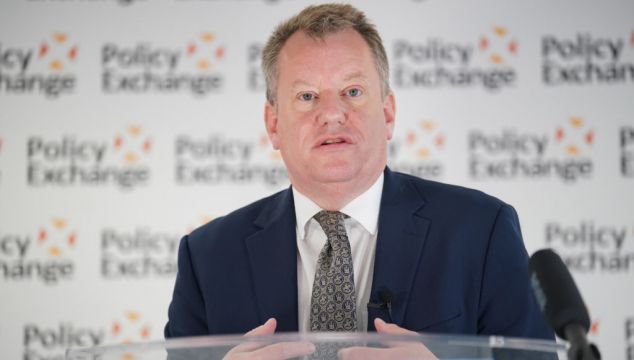The UK’s former Brexit minister has rejected a claim levelled by the Taoiseach that he tried to “torpedo” a proposed resolution to the Northern Ireland Protocol row.
David Frost said Micheál Martin was “simply wrong” after the Taoiseach suggested he had attempted to deliberately undermine compromise proposals tabled by the European Commission last year.
The ex-minister, who quit the cabinet late last year, also claimed the UK’s position on the protocol was being “ignored or misrepresented”.
In those circumstances, Mr Frost said it was “hardly surprising” that the UK government was considering unilateral action to address issues with the controversial post-Brexit Irish Sea trading arrangements.

Speaking to reporters in Cork on Saturday, Mr Martin claimed the UK had failed to provide clarity to the EU on what it would be prepared to accept to resolve the stand-off on the protocol.
To illustrate his point, he claimed Mr Frost had deliberately raised the issue of European Court of Justice oversight just at the point when European Commission vice president Maros Sefcovic was about to unveil proposals aimed at reducing red tape on trade between Great Britain and Northern Ireland.
Mr Martin made the comments as he responded to questions on the political impasse in Northern Ireland triggered by the DUP’s refusal to re-enter a powersharing executive in protest at the protocol.
In remarks reported by the Irish Times, the Taoiseach suggested the fundamental challenge in resolving the protocol issue was not with unionism, but with the approach adopted by the UK government.
“I think unionism has made a case to us, and we have discussed it over time with the European Union,” he said.
“The European Union has met the unionist community and it has met with businesses and with industry in Northern Ireland and came forward with proposals.
“But the European Union really has never got a landing zone from the British government in relation to the protocol. It’s very unclear what will suffice for the British government. We have some sense of what would work with unionism, but we don’t have that sense with the British government.”
In an apparent reference to a speech made by Mr Frost in Lisbon last October, Mr Martin added: “Unionism did raise issues about the operation of the protocol which we did work with our European Union colleagues to try and deal with and, if you recall just prior to Maros Sefcovic outlining his proposals, Lord Frost tried to torpedo them by raising the issue of the European Court of Justice.
“That was a deliberate attempt, it seems to me, to undermine what Maros Sefcovic was about and we need less of that from the British government to be frank and the problem for Europe is that Europe is not sure and has no trust now as to what would settle the protocol issue.”
I wouldn't normally want to use Twitter to reply to @MichealMartinTD the Taoiseach, but, as he accuses me personally of wrecking the talks last year, I feel I must respond. https://t.co/muRnaJdJqZ
— David Frost (@DavidGHFrost) May 14, 2022
Advertisement
In response to Mr Martin’s comments, Mr Frost tweeted: “I wouldn’t normally want to use Twitter to reply to @MichealMartinTD the Taoiseach, but, as he accuses me personally of wrecking the talks last year, I feel I must respond.
“The suggestion the UK has not set out a ‘landing zone’ is simply wrong. Our July 2021 Command Paper and the legal text that followed it were a very clear landing zone, explained in significant detail.
“That July paper was also very clear that the role of the Court of Justice had to be removed. So it is simply wrong to say that I raised it for the first time in October in my Lisbon speech or that the aim was to wreck the talks process.
“If the Protocol problem is to be resolved, Ireland & the EU need to engage with what we have actually said. I’ve always been clear a negotiated way forward would be best. But if HMG positions are ignored or misrepresented it is hardly surprising unilateral action is on the table.”
Mr Martin also said he had told British prime minister Boris Johnson that unilateral action by the UK government on the protocol would be a mistake.
“I made it clear that any move unilaterally to undermine the protocol would have a destabilising impact on Northern Ireland and, in my view, what is important, the British government needs to work professionally with the European Union in terms of resolving any issues about the protocol,” he said.
Mr Martin said: “The United Kingdom government need to put the stability of the political situation in Northern Ireland first and foremost – these issues can be resolved – and I know unionism stands ready to resolve them as well.”
The Taoiseach urged the DUP to drop its block on the formation of a new executive and assembly, insisting governance in Northern Ireland could run in parallel with negotiations to resolve the protocol problems.
“Discussions around the protocol should be parallel with the restoration of the executive and the restoration of the assembly because democracy means there is a duty on all parties to fulfil the mandate given to them by the people and that is to set up the assembly and to set up the executive,” he said.
“Then the executive and the assembly can make a strong contribution to the resolution of the issues around the protocol, but I think the British government needs to think long and hard on its strategy and its approach because in my view, its unilateral approach is not helpful whatsoever.”







